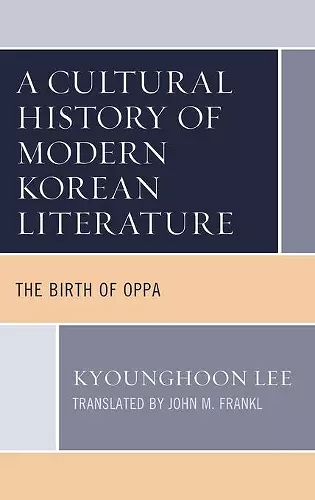A Cultural History of Modern Korean Literature
The Birth of Oppa
Kyounghoon Lee author John M Frankl translator
Format:Hardback
Publisher:Bloomsbury Publishing PLC
Published:7th Feb '22
Currently unavailable, and unfortunately no date known when it will be back

A Cultural History of Modern Korean Literature: The Birth of Oppa examines the cultural and social impact of Japanese colonialism and modernity on the wider aspects of everyday life in Korea. Selected as an outstanding work in 2004 by the National Academy of Sciences in South Korea, is by any measure a remarkable work. Lee considers a wide range of literary and cultural texts, exploring significant historical moments and phenomena while critically assessing personal experience and social life, mainly how modernity, colonialism, and total war shaped national and cultural identities. This text also reflects the complex and refractory legacy of Japanese colonialism and modernity. Lee’s foray into the complex relationships between Korea, Japan, and the West offers a thoroughly engaging study of the origins of modern Korean culture and society during the first half of the 20th century. The first of its kind, Lee offers a richly vivid portrait of a rapidly changing landscape, fueled by modernity and technology, one that will appeal to general readers and students alike.
A Cultural History of Modern Korean Literature takes readers on a dazzling journey through Korean literature. The unconventional history that results will both fascinate and provoke further interest in the early modern cultural products of a nation whose contemporary culture has ignited curiosity across the world. This accessible study will find broad appeal among college students, scholars, and anyone interested in the history and culture of Korea and the Japanese empire. -- Janet Poole, University of Toronto
This study was a landmark book when it first came out in 2003, and since then it has remained a classic in Korean literature and cultural studies. Through a brilliant analysis of a vast number of texts of various genres and types, Lee offers a comprehensive and insightful look at the thoroughgoing changes that the imbrication of colonialism and modernity brought to Korea in the first half the twentieth century. This book is a major scholarly achievement and John M. Frankl indeed does justice to the Korean original in his flawless English translation. -- Jin-Kyung Lee, University of California, San Diego
This study draws our attention to Korean literary texts—especially their easily overlooked minor details—to bring to the fore what colonialization meant to Koreans and how it affected everyday practices. This book provides fascinating entryways into Korean literature for students and scholars of East Asian and world literature, and it also rekindles scholarly conversations about how to renew our understanding of colonialism in East Asia. -- Yoon Sun Yang, Boston University
This work reconsiders some of the most seminal texts in modern Korean literature through a cultural-historical lens and offers incisive analyses of how the logic of modernity constructed everyday life and material reality in colonial Korea. Notably, Lee steers clear of ideologically saturated patterns of reading that have dichotomized nationalist resistance and colonial collaboration as the master paradigm in Korean literary scholarship. Thus, Lee is able to open up new territory in postcolonial studies in Korea and enter into dialogue with studies of global modernity more broadly. -- Youngju Ryu, University of Michigan
ISBN: 9781666906288
Dimensions: 228mm x 161mm x 28mm
Weight: 617g
294 pages